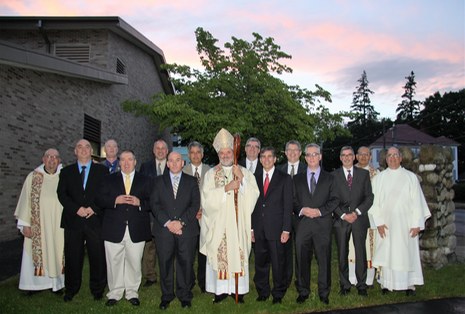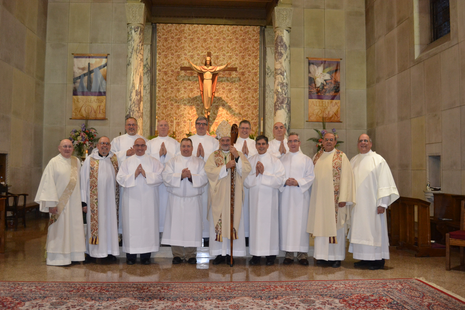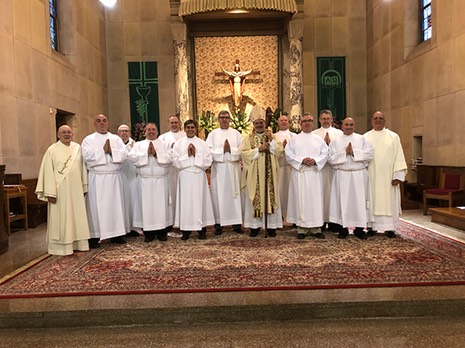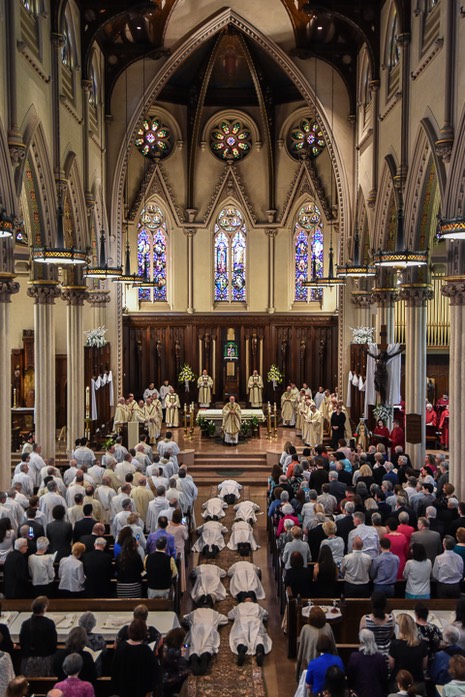FORMATION
Continuing Formation Guidelines and CEU FormCandidate Formation Class SchedulesFall River WebinarsNADD Region 1 Webinars
EVENTS/Retreats
Couples Retreat 2024 (Coming Soon)
NEWSLETTER
Current IssueDocuments, REPORTs and Forms
Reports and FormsLetter of Suitability RequestDeacon HandbookMinistry Agreement (MOU)Update Deacon ProfileJOURNEY OF THE 9th DIACONATE CLASS

Admission to Candidacy - June 8, 2016
Eleven men aspiring to become permanent deacons were admitted to candidacy at a Mass on June 8, 2016 at 7 pm at the Holy Name of the Sacred Heart of Jesus Church in New Bedford, MA. Bishop Edgar da Cunha celebrated the Mass during which the admission ceremony took place.
Assisting Bishop da Cunha were Msgr. John J. Oliveira, diocesan director of the Permanent Diaconate Program and Rev. Robert Oliveira, associate director of the Permanent Diaconate Program. Deacon Frank Lucca, assistant director of deacon and candidate formation, and Deacon Eugene Sasseville of Holy Name of the Sacred Heart of Jesus Parish served as deacons of the Mass.
The prospective candidates are the ninth class for the permanent diaconate in the diocese and have been in formation for one and a half years.
Pope Paul VI, in his Apostolic Letter, Ad Pascendum, wrote, concerning candidacy, “Admission to Candidacy for Ordination as a deacon, comes about by a means of a special rite, by which one who aspires to the diaconate...publicly manifests his will to offer himself to God and the Church, so that he may exercise sacred orders. The Church in accepting his offering, chooses and calls him to prepare himself to receive a sacred order, and in this way he is rightly numbered among candidates for the diaconate."
Admission to candidacy occurs when the prospective candidates have reached maturity of purpose and have demonstrated other necessary qualifications along with their completion of the required preparatory steps. During the ceremony, candidates publicly express their desire to be ordained as deacons and the Bishop accepts their declaration.
“I am grateful for these men who have volunteered to serve the church as deacons,” Msgr. Oliveira said. “They are good men, filled with enthusiasm and willing to bring the message of Jesus to others. I look forward to the day that they will be able to exercise their diaconal ministry in our diocese.”
Priests of the diocese joined the pastors of the prospective candidates, including priests who are their spiritual directors and formation instructors, in concelebrating the Mass. Deacons and wives from the diocese and the families of the candidates were also present to join in prayer at the Mass.
“The candidates have completed a period of aspirancy during which they were advised of the role of the deacon; expectations for formation; and the ministry to which they have been called,“ said Deacon Frank Lucca. “Following a lengthy selection process of the many who showed interest, these men underwent interviews, discernment, reflections and a spiritual retreat. A number of our deacons were involved in this process and I am grateful to them,” he continued.
During aspirancy, prospective candidates submitted required documentation and participated in psychological evaluations. They have completed one year of study, which included Introduction to Theology taught by Rev Robert Oliveira, Prayer and Spirituality taught by Rev. Daniel Lacroix, Revelation/Christology taught by Rev. Leonard Hindsley and Ecclesiology taught by Rev. David Pignato. They will continue with three more years of academic and pastoral formation before ordination as deacons.
“We are fortunate in this diocese to have so many talented and willing priests and lay people taking part in and dedicated to teaching courses in theology to the candidates in their first study year as well as the next three years. We are also pleased that we have both men and women instructors involved in the formation of our candidates,” said Fr Bob Oliveira.
“Days of Reflection have also been held for the wives of our deacon candidates,” continued Fr Bob Oliveira, “and of course the wives of these candidates are invited to participate in all of the formation classes held throughout the year. In fact, all deacons and their wives are also invited to and encouraged to continue their own formation by attending these classes.”
The candidates and parishes include:
Richard Bisson, Sr., Christ the King Parish, Mashpee
Keith Caldwell, Our Lady of Victory Parish, Centerville,
Gary Donahue, Holy Cross Parish, Easton
Kevin Gingras, Holy Family Parish, Taunton
David Harum, St Vincent DePaul Parish, Attleboro
George Hults, Corpus Christi Parish, Sandwich
Antonio Pimental, St Francis Xavier Parish, Acushnet
Paul Spearin, St Ann Parish, Raynham
Matthew Sweeney, St Theresa of the Child of Jesus Parish, Attleboro
Ministry of Reader Installation - June 6, 2017
History of this Ministry:
Before Vatican II, there were FOUR MINOR ORDERS,.
lector, exorcist, acolyte and porter. There was also subdiaconate. These were required before one could receive the Sacrament of Orders as a deacon or priest. Vatican II called for the revision of sacraments and liturgy. The revisions came about because almost no one performed the ministries of porter, exorcist, and indeed, even lector. Pope Paul VI issued the defining document in 972, the Motu Proprio entitled Ministeria Quaedam. This eliminated minor orders completely, eliminated tonsure and subdiaconate. He established two “offices” of reader and acolyte, which will include the functions of the subdiaconate.
Paul VI – Norms regarding the Holy order of Deacons. 1972
“It is especially fitting that the ministries of reader and acolyte should be entrusted to those who, as candidates for sacred orders, desire to devote themselves to God and to the Church in a special way. …Both by study and by gradual exercise of the ministry of the word and of the altar, candidates for sacred orders should through intimate contact understand and reflect upon the double aspect of the priestly office… In this way, candidates are to approach holy orders fully aware of their vocation, fervent in spirit, serving the Lord, constant in prayer, and aware of the needs of the faithful.”
“Candidates for the permanent dIaconate and for the dIaconate leading to the presbyterate, as well as candidates for the presbyterate itself, are to receive the ministries of reader and acolyte, unless they have already done so, and are to exercise them for a fitting time, in order to be better disposed for the future service of the word and of the altar.
Comments on Ministeria Quaedam. According to Pope Paul VI, these are not so much a share in the priesthood of ordained priests, but ministries for the laity, who by Baptism share in the priesthood of Jesus Christ. They are seen as a good preparation for priesthood, but not so much as a stage in the process towards ordination. They do have canonical status, and have a special Rite of Installation. In some ways, Paul VI was dismantling a clerical system that had existed for centuries by emphasizing non-clerical, lay ministries. But the surprise or irony is that these two ministries are very rarely given to laity, and almost exclusively are given to seminarians on the path to ordination. While there are many lay men (and women) serving as readers and ministers of Communion, they are usually commissioned in a parish, by a parish priest. They are not officially installed by the ordinary (bishop).
How does one become a Reader?
It is conferred By “institution” rather than “ordination.” One does not become a cleric by being instituted as a Reader. “ministries may be committed to lay Christians; hence they are no longer to be considered as reserved to candidates for the sacrament of orders.” As a matter of fact, very few strictly lay persons are readers or acolytes in the sense of “instituted”. Many serve in those capacities (altar servers, lay readers, through simple commissioning by the parish priest, or even without that commissioning. The Rite of Institution would be not a sacrament (as is Orders) but a sacramental. The ministries are conferred by the ordinary (the bishop, and in clerical institutes, the major superior).
Requirements:
a) a petition freely made out and signed (Cf. Form)
b) suitable age and special qualities to be determined by the Episcopal conference
c) a firm will to give faithful service to God and the Christian people.
Only men can become stable, readers (and acolytes) even if women can become temporary readers and altar servers.
Function, Responsibilities of the Reader
From Ministeria Quaedam. “He may also, in so far as necessary, take care of preparing other faithful who by a temporary appointment, are to read the Scriptures in liturgical celebrations.
From the General Instruction on the Roman Missal, 2000, No. 99.
The reader is instituted to proclaim the readings from sacred scripture, with the exception of the gospel reading. He may also announce the intentions for the general intercessions, and in the absence of the psalmist, sing or read the psalm between the readings. In the celebration of the Eucharist, the reader has specific duties which he alone ought to perform, even though ordained ministers may be present.
No. 101. In the absence of an instituted reader, other lay people may be designated to proclaim the readings from the sacred scriptures.
From the Rite of Installation - homily of the bishop
“…You will proclaim that word in the liturgical assembly, instruct children and adults in the faith and prepare them to receive the sacraments worthily. You will bring the messages of salvation to those who have not yet received it…In proclaiming God’s word to others, accept it yourselves in obedience to the Holy Spirit. Meditate on it constantly, so that each day you will have a deeper love of the Scriptures and in all you say and do show forth to the world our Saviour, Jesus Christ.”
Reflections on the Ministry of Readers:
“The Church has always venerated the divine Scriptures as she venerated the Body of the Lord, in so far as she never ceases, particularly in the sacred liturgy, to partake of the bread of life and to offer it to the faithful from the one table of the Word of God and the Body of Christ” (Vatican II, Divine Revelation, No. 21)
Cf. Introduction to the Lectionary, no. 55 - preparation needed for those who will be readers – “spiritual and technical” (know Scriptures and know the Liturgy, and know how to read in public). Note that this is directed to those who serve temporarily as readers, and so it applies even more to those who are “stable” readers, namely those who are installed officially as lectors.
Sacredness of the Word of God.
“Tell me, which seems to be greater – the body of Christ or the Word of Christ? If you wish to answer accurately, you must say this: the word of God is not less than the body of Christ. Therefore, as the solicitude which we observe when the body of Christ is ministered to us is such that not a particle of it falls from our hands to the earth, so too, with as much care should we see to it that the word of God, which is his gift to us, does not perish from our heart, while we are thinking or talking about something else. Because we will be no less guilty.” (Caesarius of Arles, 6th century).
Proclaim rather than read
Overall responsibility for the Word of God - bible study, divine office, liturgical services, parish societies using the Word of God.
Different types of texts in the Scripture - Warm letters, prophetic denunciation, poetic
Know the Lectionary, Cycles, How it is put together, which readings relate
How to Prepare for your assignment as lector (Irish broadcaster, “four days – not enough time!”
Qualities of a good reader - dignity, clarity, eye contact
Improving your speech, diction, presence
Ministry = service - responsibility


Ministry of Acolyte Installation - June 19 2018
Nine candidates who are studying for the Fall River Permanent Diaconate have been installed as acolytes at a Mass celebrated by Most Reverend Edgar da Cunha, Bishop of Fall River, on Wednesday, June 19, 2018, at 7:00 p.m., at Holy Name of the Sacred Heart of Jesus Church, in New Bedford.
Assisting Bishop da Cunha, was Reverend Robert J. Oliveira and Deacon Frank Lucca, Co-Directors of the Permanent Diaconate Program.
The ministry of acolyte is the second of two ministries which candidates must receive and exercise as part of their preparation for ordination as a permanent deacon.
These candidates are the ninth class for the Permanent Diaconate of the Diocese and have been in the formation program for three years. They will continue in one more year of academic and pastoral formation before ordination as deacons:
Priests were invited to join the pastors of the candidates, priests who are their Spiritual Directors, and Formation Instructors, in concelebrating the Mass. Deacons and Wives from the diocese and the families of the candidates were invited to join in prayer at this Mass.
The candidates and parishes include:
Richard Bisson, Sr., Christ the King Parish, Mashpee
Keith Caldwell, Our Lady of Victory Parish, Centerville,
Gary Donahue, Holy Cross Parish, Easton
Kevin Gingras, Holy Family Parish, Taunton
David Harum, St Vincent DePaul Parish, Attleboro
George Hults, Corpus Christi Parish, Sandwich
Antonio Pimental, St Francis Xavier Parish, Acushnet
Paul Spearin, St Ann Parish, Raynham
Matthew Sweeney, St Theresa of the Child of Jesus Parish, Attleboro
Ordination of the 9th Class - May 18, 2019
The 9th Diaconate class was ordained on May 18, 2019 by Bishop Edgar da Cunha.
Video of the ordination ceremony may be found below:

“Brothers, select from among you seven reputable men, filled with the Spirit and wisdom, whom we shall appoint to this task..."
Acts of the Apostles 6:3
Fill out my online form.
